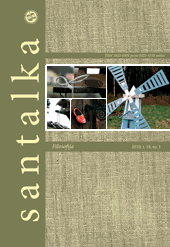Dialoginės kalbos mokymo metodikos nekalbinėje aukštojoje mokykloje prioritetai
Priorities of Dialogic Speech Teaching Methodology at Higher Non-Linguistic School
Author(s): Vida Asanavičienė, Nijolė ŽegūnienėSubject(s): Language and Literature Studies
Published by: Vilnius Gediminas Technical University
Keywords: linguistic activity; its types; the understanding of the dialogue essence; linguistic psychological dialogue basics; dialogue replications; soluble communicative tasks; preparatory exercises; communicative exercises.
Summary/Abstract: The article deals with a number of relevant methodological issues. First of all, the author analyses psychological peculiarities of dialogic speech and states that the dialogue is the product of at least two persons. Therefore, in this view, dialogic speech, unlike monologic speech, happens impromptu and is not prepared in advance. Dialogic speech is mainly of situational character. The linguistic nature of dialogic speech, in the author’s opinion, lies in the process of exchanging replications, which are coherent in structural and functional character. The author classifies dialogue groups by the number of replications and communicative parameters. The basic goal of dialogic speech teaching is developing the abilities and skills which enable to exchange replications. The author distinguishes two basic stages of dialogic speech teaching: 1. Training of abilities to exchange replications during communicative exercises. 2. Development of skills by training the capability to perform exercises of creative nature during a group dialogue, conversation or debate.
Journal: Santalka: Filologija, Edukologija
- Issue Year: 18/2010
- Issue No: 4
- Page Range: 5-10
- Page Count: 6
- Language: Lithuanian

